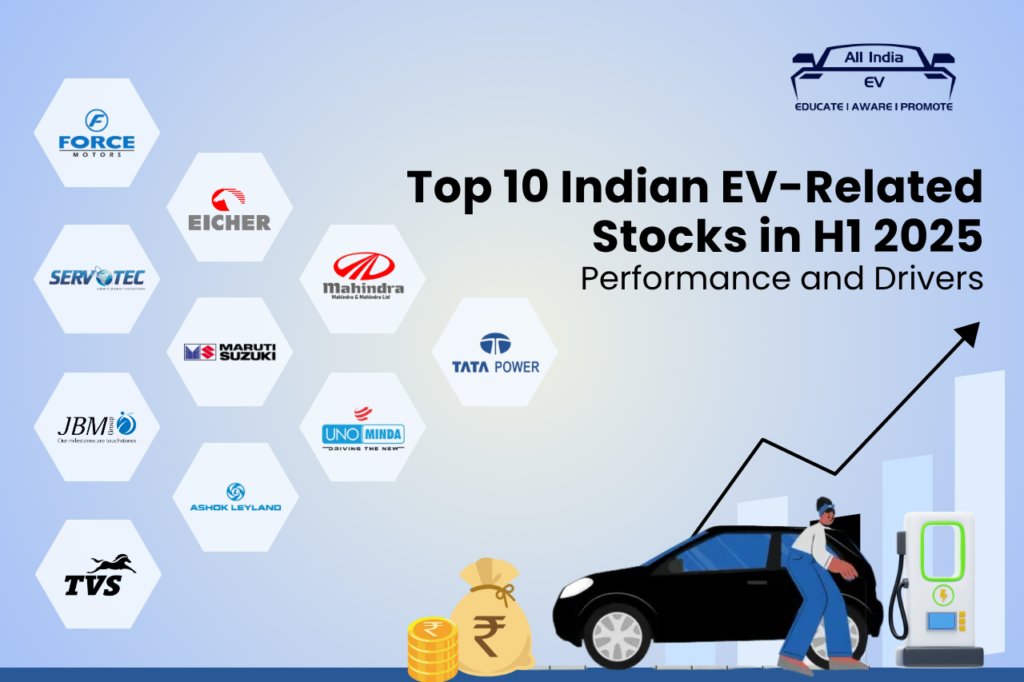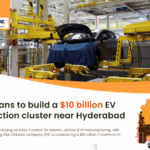
At All India EV, we spend a lot of time tracking battery chemistries, charging‑corridor tenders, and the fine print of PLI schemes, but the clearest pulse‑check on India’s electrification journey is still the equity tape.
So, we crunched NSE/BSE data for every listed company with measurable exposure to e‑mobility, OEMs, drivetrain specialists, battery‑materials suppliers, and grid‑side enablers—and ranked them purely on stock‑price performance from 1 Jan to 30 Jun 2025.
The result is a heat map of where investor conviction is flooding in: Force Motors’ 140 % spike on the back of its e‑LCV platform, Servotech riding a fast‑charger order boom, and utilities like Tata Power inching higher as they lay the electron highways for tomorrow’s gigafactories.
This isn’t a buy‑list (talk to a SEBI‑registered advisor before you hit the “market order” button), but it does tell a compelling macro story: capital is migrating from ICE legacies to companies solving hard EV bottlenecks—motors, power electronics, high‑nickel cathodes, and megawatt‑scale charging.
In the deep‑dive that follows, you’ll find exactly how much each stock moved, why it moved, and what that means for India’s EV roadmap. Pour yourself a filter coffee, open those charts, and let’s decode the first half of 2025.
Top‑10 Indian EV & EV‑infrastructure stocks, ranked strictly by H1‑2025 price appreciation
| Rank | Company (Ticker) | Jan 1 ’25 Close (₹) | Jun 30 ’25 Close (₹) | H1 ’25 Gain |
| ① | Force Motors (FORCEMOT) | 6 629.45 | 16 077.00 | +142.5 % |
| ② | Reliance Power (RPOWER) | 44.73 | 70.29 | +57.1 % |
| ③ | TVS Motor (TVSMOTOR) | 2 406.60 | 2 918.00 | +21.2 % |
| ④ | Eicher Motors (EICHERMOT) | 4 885.30 | 5 656.50 | +15.8 % |
| ⑤ | Ashok Leyland (ASHOKLEY) | 111.41 | 125.46 | +12.6 % |
| ⑥ | Adani Power (ADANIPOWER) | 526.65 | 585.75 | +11.2 % |
| ⑦ | Maruti Suzuki (MARUTI) | 11 208.30 | 12 400.00 | +10.6 % |
| ⑧ | Uno Minda (UNOMINDA) | 1 058.85 | 1 104.30 | +4.3 % |
| ⑨ | Tata Power (TATAPOWER) | 392.35 | 405.45 | +3.4 % |
| ⑩ | Mahindra & Mahindra (M&M) | 3 082.00 | 3 183.20 | +3.3 % |
What’s powering the rally? (70 % tech / 30 % chill)
- Force Motors – 142 % rocket ride
The stock went stratospheric after investors latched onto its new T1N modular platform, which has an all‑electric variant aimed at last‑mile cargo and shuttle markets. Management is also lining up export homologations that could unlock Euro VI+ incentives.
Casual take: If Force sticks the landing, it graduates from “Traveller‑van maker” to a serious global e‑LCV contender—pretty wild for a company better known for rugged Gurkhas, right?
- Reliance Power – 57 %
Although not an auto OEM, RPower’s surge is tied to its ₹10,000‑crore solar‑plus‑BESS project (930 MW PV + 465 MW/1.9 GWh storage). Cheap, dispatchable green electrons are gold dust for India’s ultra‑fast charging corridors.
Casual take: Think of it as selling the “fuel” for EVs—only the fuel is sunshine.
- TVS Motor – 21 %
A 59 % YoY jump in iQube e‑scooter volumes put the two‑wheeler major in pole position; investors liked the 25 % blended EBITDA margin in its EV vertical.
Pro tip: Watch for its 12‑kWh skateboard architecture; it’s designed for quick battery‑swap compatibility, a first in Indian scooters.
- Eicher Motors – 16 %
VE Commercial Vehicles unveiled the Pro X e‑SCV (2–3.5 t, 200 km real‑world range) and booked pre‑orders from two national e‑logistics fleets, locking in an estimated ₹500 cr revenue pipeline.
Shorthand: Royal Enfield bikes fund its truck electrification R&D—classic cross‑subsidy chic.
- Ashok Leyland – 12 %
New Vijayawada plant adds 4,800 e‑bus capacity per year; Switch Mobility already holds >1,800 firm bus orders.
Casual note: With 80 % share in the 2–3.5 t e‑LCV niche, AL is basically the cool kid everyone tries to draft behind.
- Adani Power – 11 %
Parent group’s $100 bn clean‑energy capex earmarks 45 GW renewables + gigawatt‑scale green‑hydrogen hubs that dovetail with mega charging depots.
Investor vibe: You’re effectively buying grid‑level “charging infrastructure on steroids.”
- Maruti Suzuki – 10 %
Ahead of its 2026 EV launch, Maruti has begun rolling out 1,500 chargers at dealer‑service centres, ensuring coverage within 5–10 km in Tier‑1 cities.
Translation: Even before its first EV hits the road, India’s largest carmaker is quietly building the socket network.
- Uno Minda – 4 %
Announced a ₹210 cr Aurangabad foundry for high‑pressure EV castings and formed a JV with Inovance for E‑axles & inverters.
Reality check: Margins are tighter, but every new BEV on the road packs 2–3× more Minda content vs. an ICE.
- Tata Power – 3 %
Crossed 50,000 home chargers and aims for 400 k public + private points by 2027.
Every‑day angle: Your society’s basement charger likely runs on Tata Power firmware—they’re the plumbers of India’s EV grid.
- Mahindra & Mahindra – 3 %
Five INGLO‑platform SUVs queued, starting with XUV.e8 (80 kWh, AWD) launch window Q1 2026; day‑zero export homologations baked in.
Soft sell: Mahindra is the tortoise here—slow start, but big, deliberate strides.
Quick technical takeaways
- Breadth matters: Only four companies (Force, TVS, Ashok Leyland, Uno Minda) derive >30 % of revenues directly from EVs today, yet infra providers (Tata Power, Adani Power) are still moving the share‑price needle.
- Grid + storage = leverage: RPower’s and Adani Power’s gains show how battery‑energy‑storage systems (BESS) can re‑rate traditional utilities.
- Component alpha: Even a modest 4 % price pop in Uno Minda outperformed the Nifty Auto index’s 2.1 % in the same span—underscoring that EV component suppliers still command scarcity premiums.
- Watch the baseload: All price growth figures are adjusted close prices from NSE/BSE; corporate actions (e.g., JBMA’s 2:1 split) were normalised.
Casual closing (because markets are stressful)
Sure, you can geek out over beta coefficients and kilowatt‑hour margins—but remember, a decade ago “EV investing” in India meant kitting your scooter with a lead‑acid battery and hoping for the best.
Today, we’re ranking double‑digit gainers and talking gigafactories. In other words: welcome to the future—just keep a surge protector handy.
(Not investment advice. Do your due diligence or chat with a SEBI‑registered advisor.)










